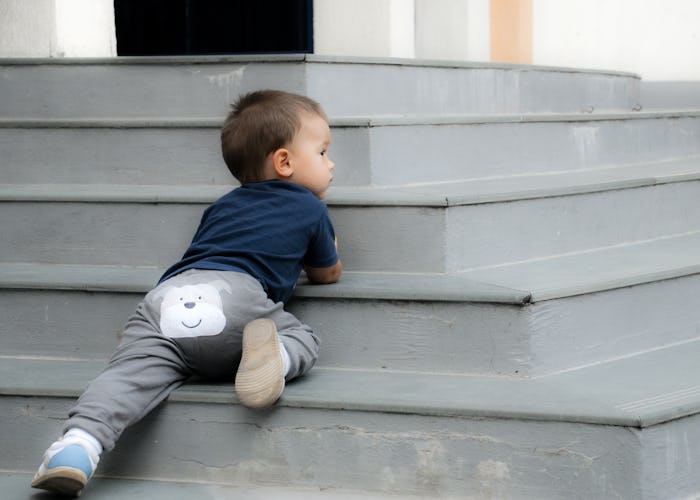Life

5 Ways Your Baby Is Telling Someone To GTFO
You're at the market, tired and beaten, after spending the last 30 minutes of a "quick" milk and eggs run walking in circles consoling your cranky baby. His eyelids finally begin to get heavy and you rush to the dairy aisle for the last of your essentials. Then it happens. A complete stranger approaches your kid and starts a loud baby talk conversation. Immediately, your little one startles awake and begins wailing. The stranger looks offended and walks away, and this is just one of the ways your baby is telling someone to f*ck off.
You may think that your kid is too young to have formed an opinion of others, but according to Dr. Sears, babies are like little FBI agents. They begin studying people at around four months of age in an attempt to figure out who they can and can not trust. Sometimes their behavior towards others is a reflection of how their parents react, but for the most part, babies are born with personal protective instincts. Many even develop separation and stranger anxiety as a way to balance out their curiosity with the dangers they might encounter.
Your kid may be little, but that doesn't mean they are too young to realize that certain people and behaviors make them uncomfortable. Here are some ways your baby may be telling someone to f*ck off.
1They Scream
If you approach a baby, and he cries and screams at the top of his lungs, your best bet is to back slowly away, because this kid is just not into you. Stranger and separation anxieties among babies begin at around 6 months, according to Parents, and don't taper off until about 18 months. That scream is baby speak for "Uh-uh, sister. This ain't happening today."
2They Barf
Being christened by baby barf is a right of passage for any auntie or uncle. But for some kids, that shot of baby puke is their way of telling someone they don't like to back the eff off. According to Baby Care Advice, a baby's vomiting can sometimes be caused by extreme emotional stress and can happen when someone or something is making them uncomfortable. I would prefer the middle finger to curdled milk barf, but that's just me.
3They Hide Their Face
Believe it or not, babies can be shy. Even at an early age babies show signs of shyness by turning their faces away from people they are uncomfortable around. As they get older, they may cover their face or close their eyes according to the British Psychological Society. If your kid would rather bury her face in your neck than make eye contact with Aunt Phyllis, it's likely her way of saying that she's not ready to be smothered by sticky red lipstick and a cloud of Chanel No. 5. It's time to back off, Aunt P.
4They Kick Their Legs
A study by Canada's York University's psychology professor Maria Legerstee, who sadly passed in 2015, found that babies as young as three months kicked their legs and turned in their seats when their mother's attention was diverted from them. These kids know good and well when someone else has mama's attention and they're not having it. They want their mom to pay attention to them and for that other guy to hit the bricks.
5They Give A Flat Out "No"
Obviously, infants don't know how to speak, but as they become toddlers and start to build a vocabulary, one of the first words they learn to use in context is "no."
Do you want to eat? "No."
Do you want to take a bath? "No."
Can Grandma have a kiss? "No."
If a kid is flat-out telling you "no" when you want to pick him up or give him a hug, he most likely means it. Don't be the a-hole relative who insists that every kid gives you a hug and kiss, and in turn, don't be the parent who forces your kid to show everyone physical affection. Give him the OK to replace a hug with a high-five, or even better, teach him the "sup" nod so that no germs are exchanged.